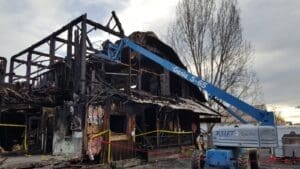Rebuilding the Mill – Architect’s Log
Published on February 3, 2016
Rebuilding the Mill – Architect’s Log – 1/26/16
Gene J. Abell, AIA, NCARB
The Abell Architectural Group, Inc.
Moving ahead:
Since most of the mill was destroyed, and there were no plans or drawings documenting the building, my first step was to call Ron Rivard, Senior Project Manager at Epic Scan. Epic Scan provides laser-scanning imagery, which gives an accurate three-dimensional model of the existing structure. The next day Ron and Carlos Velazquez, President of Epic Scan, came to the mill. With this amazing technology Ron was able to document all of the details of the remaining structure. This important digital information will be used to help us fill in what was destroyed by fire, so we can create a framework that will be the basis for creating architectural plans to rebuild the mill. Once the laser scanning was completed, the next step was to take down the heavy timber beams and columns that were still standing. Removing these heavy timbers was important for the safety of the fire investigators as they continue their investigation. Many of these beams and columns are still structurally sound. They will be sandblasted to remove the exterior charred areas, and then re-planed and reused in the restoration. Claudio Alvarez of Claudio Alvarez Construction was retained by Fire District 3 to remove unsafe remaining structural members, so that fire investigators can safely pursue their investigation. Claudio and his crew have been on the scene since the day of the fire, providing fencing around the mill, and helping with removal of the heavy timber. They will continue to work on the dismantling and removal of the parts of the building that are unsafe or unusable. They have been great to work with and continue to be an important part of the team. I called Reid Murphy of R.A. Murphy Construction, who came out and together we discussed how, once we have plans drawn, his company will be able to move ahead with the reconstruction process. From the beginning I’ve been working with the Fire District 3 Fire Marshal John Patterson and Deputy Fire Marshal and Chief Investigator, Brian Murdock, as we take steps to safely dismantle the building so their investigation can continue. I want to comment on the incredible dedication of these two men and their entire team. They arrived at the mill on Christmas morning within 3 minutes of the alarm being sounded, and stayed on site for the next 10 days. They’ve allowed me access to areas I need to view in order to get an accurate picture of what still exists. Through it all they have been friendly, helpful and supportive of the entire process. Working with Fire District 3 continues to be a pleasure.
Our next steps are:
- Continue to meet with Bob to insure that we are meeting his goals and objectives for the restoration of the Butte Creek Mill.
- Use the scanned images from Epic Scan to help us create an existing conditions set of drawings, which will ultimately be used for reconstruction.
- Locate and review sources of reclaimed heavy timber materials so the restored mill will be as authentic as possible.
- Provide Bob with drawings, renderings, documents and cost estimates that will aid him in the fundraising process.
- Work with historical architect Peter Meijer to help us with the historical restoration process, and possibly explore ways to keep the mill on the National Historic Register
In my next post we will look at how some of these steps are unfolding.

So sorry to hear the loss of this historicmill
I hope its restored in full to enjoy
Judy